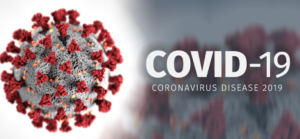Take actions now to reduce your risk of getting sick from COVID-19

Coronavirus disease 2019 (COVID-19) is a respiratory illness that can spread from person to person. The virus that causes COVID-19 is a novel (new) coronavirus that has now spread around the world, including many cases in Houston.
The Centers for Disease Control and Prevention (CDC) says that certain people are at higher risk of getting very sick from this illness. These include older adults and people with serious chronic medical conditions, such as heart disease, diabetes and lung disease.
Complications might include pneumonia in both lungs, multi-organ failure and, in some cases, death.
Getting ready for COVID-19 now
Take actions to reduce your risk of getting sick. If you are at higher risk for serious illness from COVID-19 because of your age or because you have a serious long-term health problem, it is extra important for you to take these actions to reduce your risk of getting sick with the disease.
Have supplies on hand
- Contact your healthcare provider or geriatric care manager to ask about obtaining extra necessary medications to have on hand and you need to stay home for a prolonged period of time.
- If you cannot get extra medications, consider using mail order for medications.
- Be sure you have over-the-counter medicines and medical supplies (tissues, etc.) to treat fever and other symptoms. Most people will be able to recover from COVID-19 at home.
- Have enough household items and groceries on hand so that you will be prepared to stay at home for a period of time.
There is currently no vaccine to protect against COVID-19. The best way to prevent infection is to take everyday preventive actions:
- Clean your hands often. Wash your hands often with soap and water for at least 20 seconds, especially after blowing your nose, coughing, or sneezing, or having been in a public place.
- If soap and water are not available, use a hand sanitizer that contains at least 60% alcohol.
- Avoid close contact with other people (no closer than 6 feet, which is about two arm’s length)
- To the extent possible, avoid touching high-touch surfaces in public places—elevator buttons, door handles, handrails, handshaking with people, etc. Use a tissue or your sleeve to cover your hand or finger if you must touch something.
- Wash your hands after touching surfaces in public places.
- Avoid touching your face, nose, eyes, etc.
- Clean and disinfect your home to remove germs: practice routine cleaning of frequentlytouched surfaces (for example: tables, doorknobs, light switches, handles, desks, toilets,faucets, sinks & cell phones).
- As advised by your public health officials, void crowds.
- Avoid all nonessential travel including plane trips, and especially avoid embarking on cruise ships.
If you develop these symptoms of COVID-19, get medical attention immediately. In adults, emergency warning signs include:
- Difficulty breathing or shortness of breath.
- Persistent pain or pressure in the chest.
- Fever.
- New confusion or inability to arouse.
- Bluish lips or face.
If you do get sick:
Stay home and call your doctor. Describe your symptoms. Tell them that you have or may have COVID-19. This will help them take care of you and keep other people from getting infected or exposed.
If you are not sick enough to be hospitalized, your doctor may tell you that you can recover at home. Follow your doctor’s instructions for self-care or care of a loved one
The situation changes from day to day; for the most recent, updated information, visit the CDC resources for older adults (www.cdc.gov/coronavirus/2019-nCoV/index.html).
Care Managers In Houston, Available to Assist Your Loved One
Elder Advisory Group is still open and operating in order to serve our clients and community. Please feel free to call us at (713) 624-4288 for more information.

